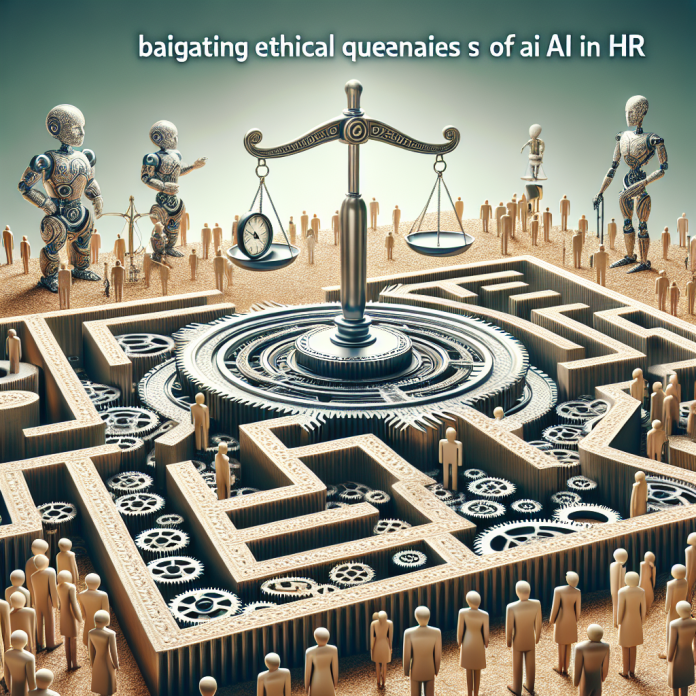Artificial Intelligence (AI) has become an integral part of various industries, including Human Resources (HR). From streamlining recruitment processes to automating mundane tasks, AI has revolutionized HR practices. However, as technology continues to advance, it raises ethical concerns that need to be addressed.
### The Impact of AI in HR
AI in HR has transformed the way organizations attract, engage, and retain talent. Recruiting software powered by AI can analyze resumes, conduct video interviews, and even predict a candidate’s likelihood of success in a role. This efficiency has saved time and resources for HR professionals while improving the candidate experience.
### Ethical Considerations in AI
As AI plays a more significant role in HR, concerns about bias, privacy, and transparency have emerged. When AI algorithms are trained on biased data, they may perpetuate discrimination in hiring practices. For example, if a company predominantly hires male candidates, an AI system trained on this data may inadvertently favor male applicants.
### Bias in AI
In 2018, Amazon scrapped a recruiting tool that used AI to analyze resumes after discovering it favored male applicants. The algorithm had been trained on ten years of resumes predominantly submitted by men, leading to biased hiring recommendations. This incident highlighted the importance of addressing bias in AI systems to ensure fair and equitable hiring practices.
### Privacy Concerns
AI tools in HR often collect and analyze vast amounts of data, raising concerns about employee privacy. From monitoring employee emails to tracking their movements in the office, AI systems can encroach on personal boundaries. Companies must navigate the delicate balance between utilizing AI for operational efficiency and respecting employees’ privacy rights.
### Transparency and Accountability
Transparency is crucial in ensuring that AI-driven decisions in HR are explainable and accountable. When AI algorithms make hiring recommendations or determine employee performance metrics, it’s essential for HR professionals to understand how these decisions are reached. Without transparency, employees may feel uneasy about the influence of AI on their careers.
### AI and Employee Well-being
While AI can enhance productivity and efficiency in HR, it also has implications for employee well-being. The automation of tasks may lead to job insecurity and disengagement among employees. As AI takes on more responsibilities traditionally handled by humans, HR professionals must consider the impact on the workforce’s mental health and job satisfaction.
### The Role of HR Professionals
HR professionals play a crucial role in addressing ethical concerns surrounding AI in the workplace. They must advocate for fair and unbiased AI systems, prioritize employee well-being, and ensure transparency in decision-making processes. By taking a proactive approach to AI ethics, HR professionals can foster a culture of trust and accountability within their organizations.
### Best Practices for Ethical AI Implementation
To ensure ethical AI practices in HR, organizations can adopt the following strategies:
1. **Diverse Data Sets**: Ensure that AI algorithms are trained on diverse and unbiased data sets to mitigate the risk of algorithmic bias.
2. **Ethical Guidelines**: Establish clear ethical guidelines for the use of AI in HR and regularly review and update them to align with changing technologies.
3. **Employee Training**: Provide employees with training on AI technologies and their ethical implications to foster understanding and awareness.
4. **Transparency**: Be transparent about the use of AI in HR processes and communicate openly with employees about how AI decisions are made.
5. **Continuous Monitoring**: Regularly monitor AI systems for potential bias or ethical violations and take corrective action when necessary.
### Conclusion
As AI continues to reshape the HR landscape, ethical considerations must remain at the forefront of decision-making processes. By addressing bias, respecting privacy rights, and prioritizing transparency, organizations can harness the power of AI while upholding ethical standards. HR professionals play a pivotal role in navigating the ethical challenges posed by AI in HR and fostering a workplace culture that values fairness and accountability. Embracing ethical AI practices is not only a moral imperative but also a strategic advantage for organizations looking to attract and retain top talent in an increasingly digital world.

